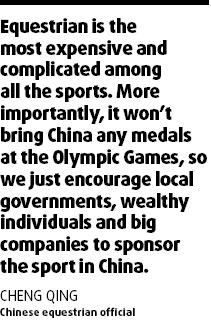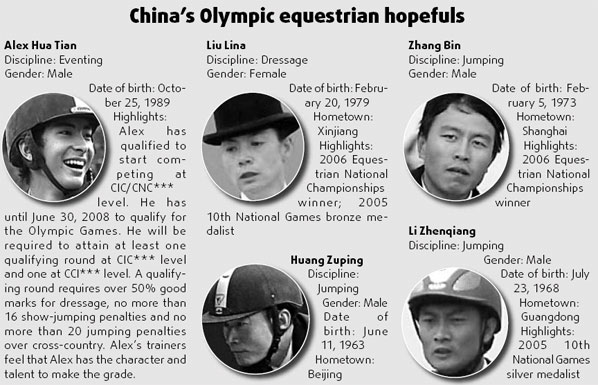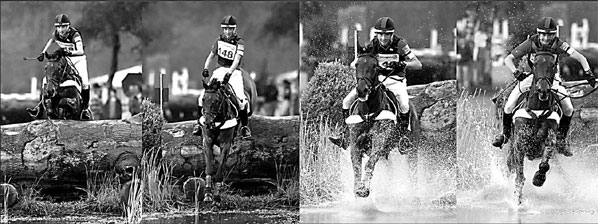China rides closer to Olympic history
|
This combination picture shows Chinese rider Alex Hua Tian jumping over a hurdle. Hua, a student of Eton College in England, leads a group of five equestrian athletes hoping to become the first Chinese riders to compete in an Olympic Games. Courtesy of Alex Hua Tian |
Just appearing in the Olympic equestrian competitions in Hong Kong this summer would be a dream come true for Chinese riders. They would be making history, after all.
Now these riders are closer than ever to realizing their dreams since five of them - and their horses - registered with the sport's governing body, the International Equestrian Federation (FEI), by the January 1 deadline.
As the host country of the Olympics, China is allotted six equestrian berths - four in jumping and one in both dressage and eventing. Although the final berth slipped away because show jumper Yu Hong could not find the right horse by the deadline, the other five Chinese riders - and their four-legged running mates - need only meet the Olympic qualifications by the end of this June and they will be on their way to the Games and into the history books.
"We can make history as long as one Chinese athlete competes in each event so that China has at least one participant in all 28 Olympic sports," Chinese Equestrian Association (CEA) Secretary General Cheng Qing told China Daily.

In a developing country like China, where the average annual income is $1,740, few can afford the high costs of horse riding. Most people have only a rudimentary understanding of the sport, if that. As a result, no Chinese rider has ever appeared in an Olympic equestrian event.
But as this year's host, China is determined to send an athlete in every sport.
"Equestrian in China lags far behind the world so we have a lot of pressure to achieve that goal," Cheng said. "Now we have five hopefuls. That is much better than we expected."
The mission seemed almost impossible at first due to China's few equestrian athletes and its lack of sponsorship.
Unlike other sports in China, the government is unwilling to invest anything in buying horses.
A sport horse for Olympic competition costs anywhere between 1.5 and 4.5 million yuan ($205,000 to $620,000) and an event rider needs between four and six horses to prepare for the Games. A sport horse for dressage costs at least 5 million yuan ($685,000).
A rider also needs to invest millions of dollars in training, competition, feed and equipment. In total, a rider spends an estimated $2.5 million to compete in the Olympics.
Two people can own a horse, but Olympic rules require that at least one of them come from the same country as the rider.
"China is a developing country and people will ask, 'How can China spend so much money on a horse?' We still need money in many important areas,'" Cheng said.
Cheng said that since a horse and rider should be perfectly matched, the CEA doesn't buy horses for its riders. The commercial management of sport horses also involves a lot of specific knowledge, he said, and the CEA has no experience in that field.
"Equestrian is the most expensive and complicated among all the sports," he said. "More importantly, it won't bring China any medals at the Olympic Games, so we just encourage local governments, wealthy individuals and big companies to sponsor the sport in China."
Last year, to attract attention to the sport and to find sponsorships, independent riders such as 44-year-old show jumper Huang Zuping and teenaged eventer Alex Hua Tian launched media campaigns around China, giving interviews, shooting TV shows and staging charity fundraising parties.
Only Hua, a student at the prestigious Eton College, secured a sponsorship, a generous 30-million-yuan ($3.8 million) donation from Jiang Fengcan, a business tycoon from Guangdong Province. Jiang's sponsorship will cover all the expenses Hua Tian needs for his Olympic preparations.
Huang is not that lucky. After he failed to find someone to pay for his horses, he had to pay for them by installments. He registered two horses while dressage rider Liu Lina and show jumpers Zhang Bin and Li Zhenqiang each registered one.
Li, another independent rider, who owns an equestrian club in Guangdong Province, paid for his horse with his own money.
Liu Lina, the best dressage rider in China, and Zhang Bin, the national show-jumping champion, gained support from local sports bureaus in Xinjiang and Shanghai, respectively. They have both trained in Germany for over five years.
Cheng said once these riders book their tickets to the Beijing Games, sponsorships will follow.
"Many potential sponsors are still watching the performances of Chinese riders," he said. "Once they book their berths in the Olympics, sponsorship will come.
"Local sports officials are aiming for the National Games following the Olympics. If Liu and Zhang can qualify for the Olympics, they can outperform the other Chinese riders and win gold medals for their hometowns."
Olympic hopeful
Of the five registered riders, Hua is China's best bet for qualifying for the Olympics.
"Hua is our biggest hope," Cheng said. "His goal should be not just qualifying for the Olympics but going further in the competition."
Hua was the first Chinese rider registered by FEI. He is also the first Chinese rider to compete in an international equestrian eventing competition.
Trained for seven years by leading eventing riders Clayton and Lucinda Fredericks, the 18-year-old, who has ridden horses since he was four, will be the youngest rider in Olympic history once he qualifies for the Games.
With the 30-million-yuan sponsorship, Hua and his parents bought six horses and set up a top international team of 20 in Britain. Besides the Claytons, the team includes a show-jumping trainer, a dressage trainer, a veterinarian, a Hong Kong climate and environment vet consultant, a groom manager, a physical therapist, a physical trainer and a competition administrator.
"It is a very complicated and professional job to select the right horses for Hua Tian and we have been so lucky to find the good ones," said Hua Tian's father Hua Shan. "Our team is also very strong with top eventing riders, the former trainers and grooms for the British team, and excellent vets. Now Hua Tian is ready to compete for the Olympic qualifications, which will kick off in March."
But Cheng worries that Hua Tian's lack of experience will hurt him in such fierce competition.
"In this sport, experience is very important for a rider, and Hua Tian may be too young to handle such a big event," he said. "The Beijing Games is a good start for him, but we're also aiming for the 2012 London Olympics."
Besides Hua Tian, another four Chinese riders are in Europe busy preparing for the qualifications. They each hope to be among the first Chinese equestrian athletes in history.

(China Daily 01/08/2008 page23)















